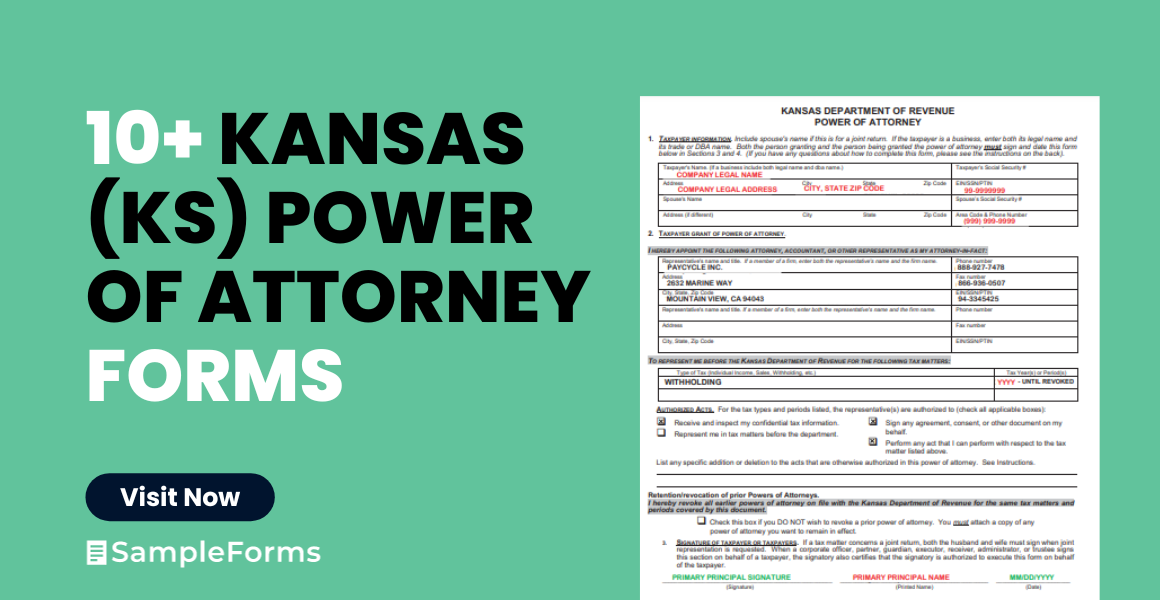Crafting a Kansas Power of Attorney Form is a pivotal step in managing your personal, financial, or health-related decisions. This guide offers insightful tips and a clear, step-by-step approach to creating a legally binding document in Kansas. Tailored to suit your specific needs, our advice ensures that your Power of Attorney form is comprehensive, compliant with Kansas laws, and effectively communicates your wishes, providing peace of mind and legal assurance.
What is the Kansas Power of Attorney Form?
The Kansas Power of Attorney Form is a legal document that allows an individual, known as the principal, to appoint someone else, called the agent or attorney-in-fact, to make decisions on their behalf. This form is used in Kansas for various purposes, such as managing finances, property, or healthcare decisions, especially when the principal is unable to do so themselves. It’s a crucial tool for ensuring your affairs are handled according to your wishes.
What is the Best Sample Kansas Power of Attorney Form?
Creating a comprehensive sample Kansas Power of Attorney (POA) form requires including several key elements to ensure it is effective and legally sound. Below is a basic template. Remember, this is a general example and should be tailored to specific needs and legal requirements. Consulting with a legal professional is always recommended for a binding and customized document.
KANSAS POWER OF ATTORNEY FORM
Principal’s Information:
- Name: ___________________________________
- Address: ___________________________________
- Phone Number: ___________________________________
Agent’s Information:
- Name: ___________________________________
- Address: ___________________________________
- Phone Number: ___________________________________
Powers Granted (check applicable powers):
- Financial Decisions
- Real Estate Transactions
- Personal and Family Maintenance
- Health Care Decisions
- Other Specific Powers: ___________________________________
Special Instructions:
Effective Date:
- This Power of Attorney shall become effective on (date) _________________.
Duration:
- Durable (remains in effect if I become incapacitated)
- Non-Durable (ends if I become incapacitated)
- Springing (becomes effective upon a specified event or condition)
Governing Law:
- This document will be governed by the laws of the State of Kansas.
Principal’s Signature:
- Signature: _________________
- Date: _________________
Agent’s Acknowledgment:
- I, _________________, accept the appointment as an agent and agree to act in the principal’s best interest to the best of my ability.
- Signature: _________________
- Date: _________________
Notarization (if required):
- State of Kansas, County of _________________
- On _________________, before me, _________________ (Notary Public), personally appeared _________________, known to me (or satisfactorily proven) to be the person whose name is subscribed to the within instrument and acknowledged that they executed the same for the purposes therein contained.
- In witness whereof, I hereunto set my hand and official seal.
- Notary Public: _________________
- My Commission Expires: _________________
This sample form is provided for general informational purposes only and may not be appropriate in all situations. It is important to consult with a legal professional to ensure that any Power of Attorney form meets all legal requirements and accurately reflects your intentions.
1. Kansas Specific Power of Attorney Form
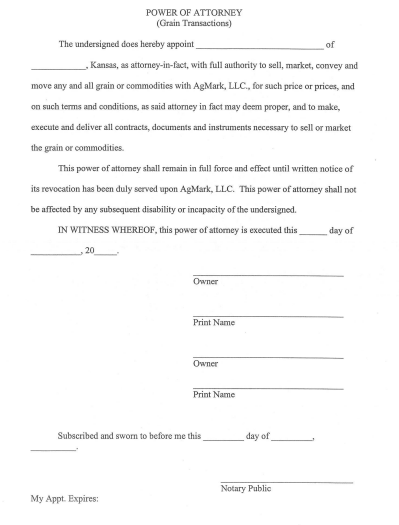
2. Kansas Sample Power of Attorney Form
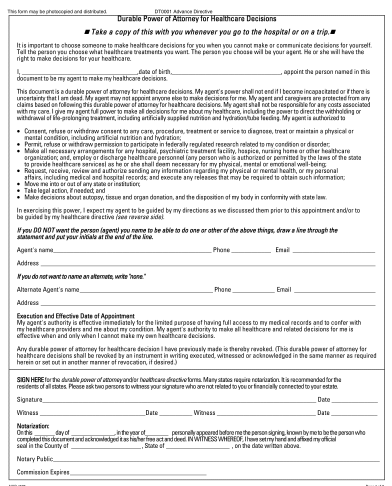
3. Kansas Printable Power of Attorney Form
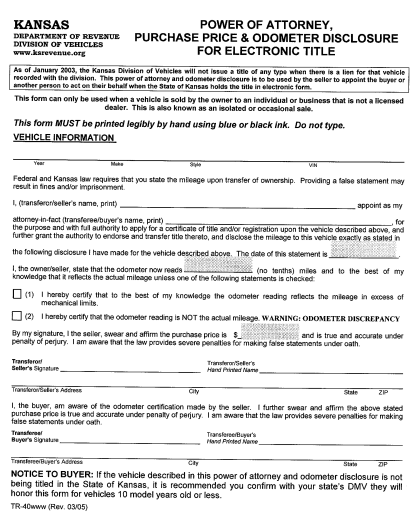
4. Kansas Power of Attorney Form
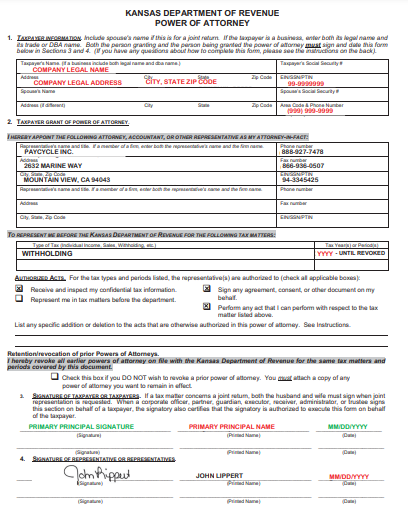
5. Kansas Minor Child Power of Attorney Form
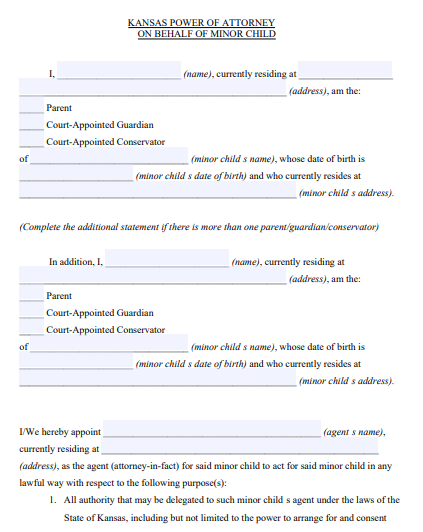
6. Kansas Medical Power of Attorney Form
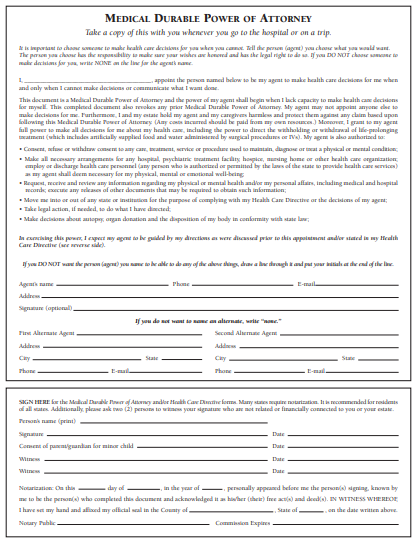
7. Kansas Health Care Power of Attorney Form
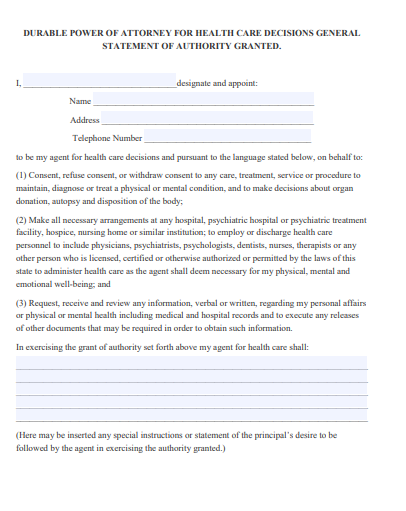
8. Kansas General Power of Attorney Form
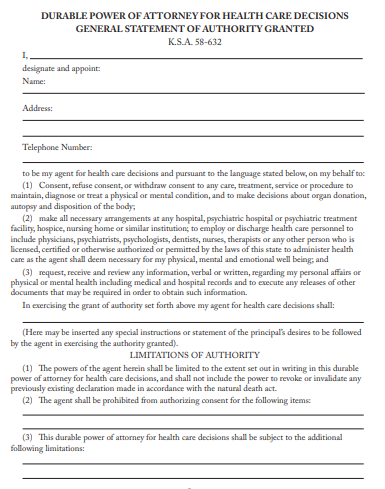
9. Kansas Durable Power of Attorney Form
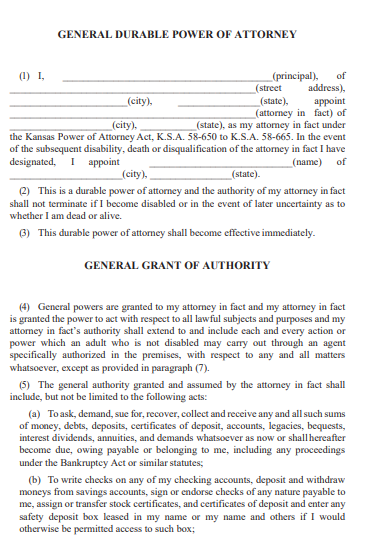
10. Kansas Blank Power of Attorney Form
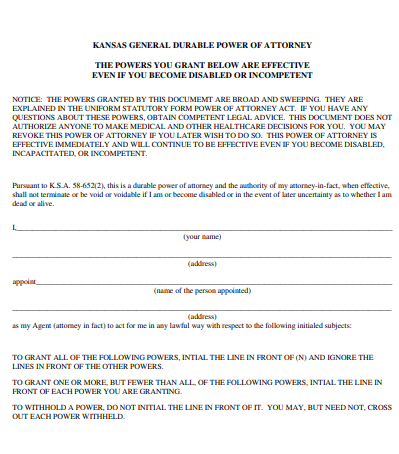
11. Kansas Advance Directives Power of Attorney Form
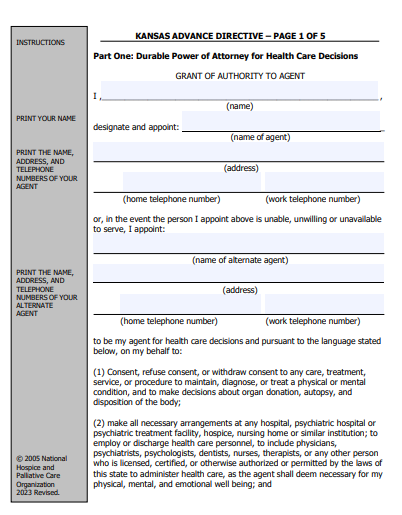
How Do You Get Power of Attorney in Kansas?
To obtain a Power of Attorney in Kansas, start by selecting a reliable agent. Use a Kansas-specific POA form, clearly defining the powers granted. Ensure the form complies with Kansas laws, including signature requirements. It’s advisable to consult a legal expert for guidance and to ensure the document’s validity and effectiveness.
Examples:
- Choosing a Trustworthy Agent: Select someone reliable and capable of making decisions in your best interest.
- Kansas-Specific POA Form: Utilize a form that adheres to Kansas state laws for legal validity.
- Defining Powers: Clearly outline the scope of authority granted to the agent, such as financial or healthcare decisions.
- Legal Consultation: Seek advice from a legal professional to ensure the form meets all legal requirements.
- Signing and Storing: Sign the form as per Kansas law and store it securely, informing relevant parties of its existence.
What is a Kansas Secure Power of Attorney Form?
A Kansas Secure Power of Attorney Form is a legal document used primarily for vehicle transactions. It grants an agent authority to handle matters related to the title and registration of a vehicle in Kansas, ensuring secure and legal handling of these specific affairs.
Examples:
- Vehicle Transactions: Authorizes an agent to handle vehicle title transfers and registrations.
- Dealership Use: Often used by car dealerships for managing vehicle paperwork on behalf of the owner.
- Secure Transactions: Ensures secure and legally compliant handling of vehicle-related transactions.
- Specific Authority: Limited to vehicle matters, providing a focused scope of power.
- Legal Compliance: Adheres to Kansas laws for vehicle transactions, ensuring legal validity.
Does a Power of Attorney Need to be Witnessed in Kansas?
In Kansas, a Power of Attorney does not necessarily need to be witnessed. However, having witnesses can add credibility and may be required for certain types, like a Durable Power of Attorney for healthcare decisions.
Examples:
- Healthcare POA: Often requires witnessing for added legal strength.
- Financial POA: May not need witnesses but can benefit from them for credibility.
- Voluntary Witnessing: Even if not required, voluntary witnesses can add legitimacy.
- Witness Qualifications: Witnesses should be adults and not the appointed agent.
- Document Integrity: Witnesses can help affirm the principal’s mental competence and voluntary nature of the document.
Does a Power of Attorney Need to be Notarized in Kansas?
In Kansas, notarization of a Power of Attorney is highly recommended for legal validity, especially for financial or real estate matters. While not always mandatory, a notarized POA is generally more widely accepted and can prevent challenges to its authenticity.
Examples:
- Real Estate Transactions: Requires notarization for recording in county records.
- Financial Institutions: Banks often require a notarized POA for transactions.
- Healthcare Decisions: Notarization adds credibility to healthcare POAs.
- Legal Strength: A notarized POA is less likely to be contested.
- State Recognition: Notarization ensures the POA is recognized across various institutions in Kansas.
What is a Power of Attorney Property in Kansas?
A Power of Attorney for Property in Kansas is a legal document granting an agent the authority to manage the principal’s property affairs. This includes buying, selling, maintaining, and handling transactions related to real estate and other personal property.
Examples:
- Real Estate Management: Authorizes an agent to handle buying, selling, or leasing property.
- Personal Property Transactions: Includes managing personal assets like vehicles or investments.
- Property Maintenance: Allows the agent to oversee property upkeep and repairs.
- Financial Decisions: Covers financial aspects related to property, like mortgage payments.
- Estate Planning: Can be part of broader estate management strategies.
What is a Durable Power of Attorney Financial Kansas?
A Durable Power of Attorney for Financial matters in Kansas is a document that allows an agent to manage the principal’s financial affairs and remains effective even if the principal becomes incapacitated. It covers a wide range of financial activities and decisions.
Examples:
- Bank Transactions: Handling bank account operations and transactions.
- Investment Decisions: Making decisions about investments and securities.
- Bill Payments: Managing and paying bills, taxes, and debts.
- Asset Management: Overseeing the principal’s assets and property.
- Business Operations: Managing business interests and decisions.
How to Prepare a Kansas Power of Attorney Form
Creating a Kansas Power of Attorney (POA) form is a critical process for ensuring your affairs are managed according to your wishes. This guide provides a detailed, step-by-step approach to help you prepare an effective POA form.
Step 1: Understanding the Purpose
- Familiarize yourself with what a Power of Attorney is and its importance in Kansas. This document allows you to appoint someone to make decisions on your behalf.
Step 2: Choosing the Right Type of POA
- Determine whether you need a General, Limited, Durable, or Healthcare POA. Each type serves different purposes and remains effective under varying circumstances.
Step 3: Selecting a Trustworthy Agent
- Choose a reliable individual who understands your values and is capable of making decisions in your best interest.
Step 4: Obtaining a Kansas-Specific Form
- Use a form that complies with Kansas state laws. These can be found online or obtained from a legal professional.
Step 5: Defining the Powers
- Clearly specify the powers you are granting to your agent. This includes decisions related to finances, health care, or property.
Step 6: Completing the Form
- Fill out the form with accurate and comprehensive information, including your details, the agent’s details, and the scope of powers granted.
Step 7: Understanding Legal Requirements
- Ensure your POA form meets all the legal requirements in Kansas, such as signature protocols and possibly notarization.
Step 8: Signing and Notarization
- Sign the document in the presence of a notary public if required. This step adds legal validity to the POA.
Step 9: Distributing Copies
- Provide copies to your agent and any relevant institutions, such as banks or healthcare facilities.
Step 10: Regular Reviews and Updates
- Regularly review and update your POA to ensure it reflects your current wishes and circumstances.
Tips for Using an Effective Kansas Power of Attorney Form
Creating and using a Kansas Power of Attorney (POA) form effectively is crucial for ensuring your affairs are managed according to your wishes. Here are some tips to help you make the most out of this important legal document.
Understand the Different Types of POA
- Familiarize yourself with the various types of POA available in Kansas, such as General, Durable, and Healthcare. Each serves a different purpose and understanding these differences is key to selecting the right one for your needs.
Choose the Right Agent
- Select an agent who is trustworthy, reliable, and capable of handling responsibilities effectively. This person should have good judgment and ideally be familiar with your personal and financial matters.
Be Specific in Granting Powers
- Clearly define the scope of authority you are granting to your agent. Specificity helps in preventing misunderstandings and ensures that your agent acts within the boundaries you’ve set.
Use a Legally Compliant Form
- Ensure that the POA form you use complies with Kansas state laws. Using a state-specific form can help in this regard, as it will include all the necessary legal terms and conditions.
Get the Document Notarized
- While not always mandatory in Kansas, notarizing your POA can add a layer of legal validity and is often required by financial institutions and other organizations.
Communicate with Your Agent
- Have an open and clear conversation with your chosen agent about your expectations, the extent of their powers, and your overall wishes. Effective communication is key to ensuring that your agent fully understands their role and responsibilities.
Keep the Document Accessible
- Store the POA document in a safe but accessible place. Make sure that your agent and any relevant institutions, like your bank or healthcare provider, have copies or know where to find it.
Review and Update Regularly
- Circumstances change, and so might your POA needs. Regularly review and, if necessary, update your POA to reflect your current wishes and situation.
Consider Consulting a Legal Professional
- For complex situations or to ensure that your POA is as effective as possible, consider consulting with a legal professional. They can provide valuable advice and ensure that your document is legally sound.
By following these tips, you can create and use a Kansas Power of Attorney form that effectively communicates your wishes and ensures that your affairs are managed as you intend.
How Do I Change My Power of Attorney in Kansas?
To change your Power of Attorney in Kansas, revoke the current document, notify the former agent, and create a new POA form reflecting the changes.
Can You Have More Than One Power of Attorney in Kansas?
Yes, in Kansas, you can appoint multiple agents in separate Power of Attorney documents for different purposes, like healthcare and financial matters.
What is a Power of Attorney Title in Kansas?
A Power of Attorney title in Kansas refers to the legal document granting someone authority to make decisions about your property, finances, or healthcare.
Does a Power of Attorney Need to be Recorded in Kansas?
In Kansas, a Power of Attorney doesn’t need to be recorded unless it’s used for real estate transactions, where recording is often required.
What is a Power of Attorney in Kansas Health Care?
A Kansas Health Care Power of Attorney is a legal document allowing you to appoint someone to make medical decisions for you if you’re unable to do so.
This guide offers comprehensive insights into creating a Kansas Power of Attorney Form. By understanding the types, choosing the right agent, and following legal protocols, you can ensure your POA is effective and reflective of your wishes. Regular updates and clear communication with your agent are key to maintaining its relevance and effectiveness in managing your affairs in Kansas.
Related Posts
-
10+ Free Arkansas (AR) Power of Attorney Form Download – How to Create Guide, Tips
-
10+ Free New Hampshire (NH) Power of Attorney Form Download – How to Create Guide, Tips
-
10+ Free Nevada (NV) Power of Attorney Form Download – How to Create Guide, Tips
-
10+ Free Nebraska (NE) Power of Attorney Form Download – How to Create Guide, Tips
-
10+ Free Montana (MT) Power of Attorney Form Download – How to Create Guide, Tips
-
10+ Free Missouri (MO) Power of Attorney Form Download – How to Create Guide, Tips
-
10+ Free Minnesota (MN) Power of Attorney Form Download – How to Create Guide, Tips
-
10+ Free Mississippi (MS) Power of Attorney Form Download – How to Create Guide, Tips
-
10+ Free Massachusetts (MA) Power of Attorney Form Download – How to Create Guide, Tips
-
10+ Free Maryland (MD) Power of Attorney Form Download – How to Create Guide, Tips
-
10+ Free Maine (ME) Power of Attorney Form Download – How to Create Guide, Tips
-
10+ Free Louisiana (LA) Power of Attorney Form Download – How to Create Guide, Tips
-
10+ Free Kentucky (KY) Power of Attorney Form Download – How to Create Guide, Tips
-
10+ Free Iowa (IA) Power of Attorney Form Download – How to Create Guide, Tips
-
10+ Free Indiana (IN) Power of Attorney Form Download – How to Create Guide, Tips
